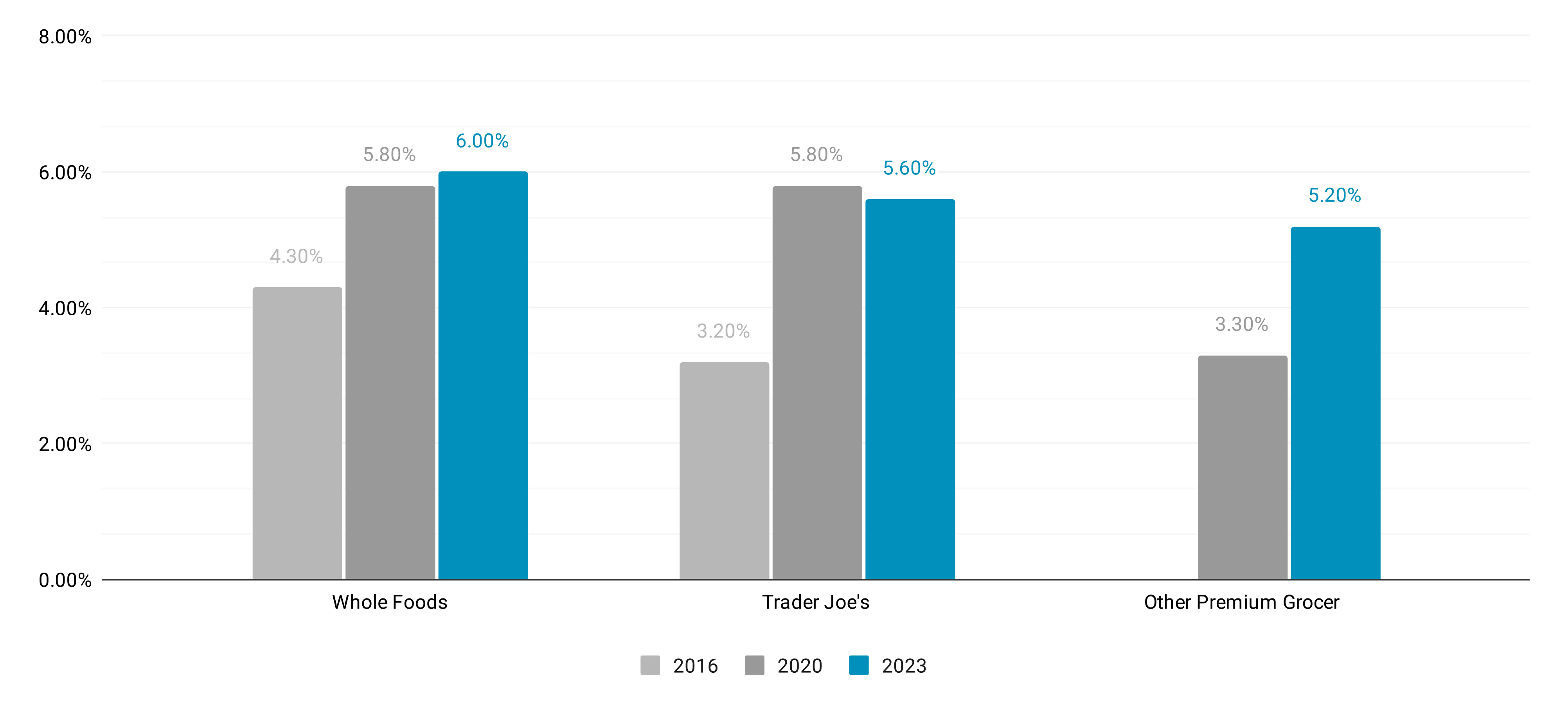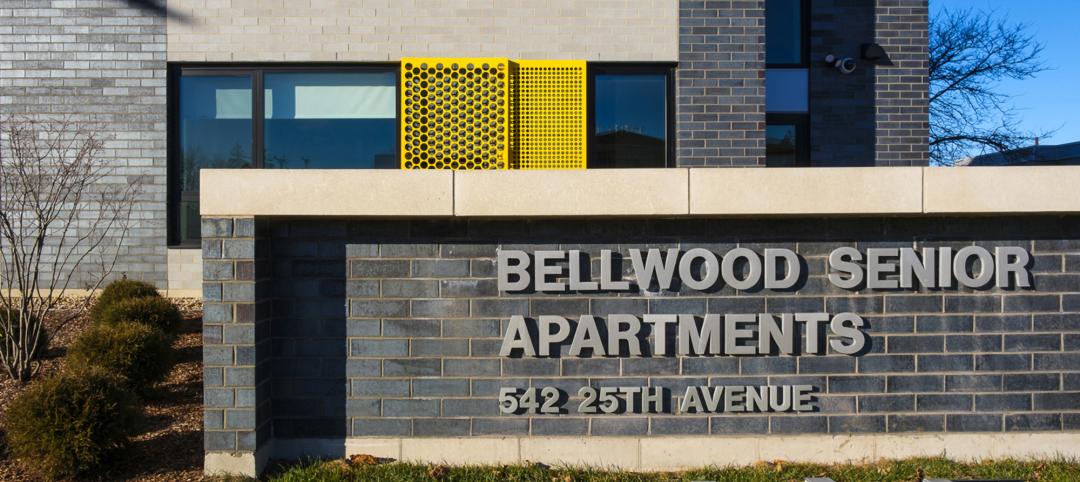Optimizing land usage is becoming an even bigger priority for developers. In some city centers, many large grocery stores sprawl across valuable land. This inefficient use of space doesn't reflect the best possible use for these desirable locations, according to the recent RCLCO report The Supermarket Rental Sweep: Analyzing Multifamily Rent Premiums Generated by Grocery Store Anchors.
One way for grocers and retail outlets to increase interest in a desirable location is by partnering with multifamily developers. The strategy of building housing above a ground floor store not only adds an extra amenity for residents, but increases the rental premium desired by developers.
Rental Rate Premiums from Ground-Floor Grocers
The multifamily performance of such partnerships is nothing to scoff at. The RCLCO analysis finds that apartment communities with a ground-floor Whole Foods achieve a rental rate premium of 6% on average—comparable to similar communities in the immediate area.
A similar figure is present for Trader Joe communities; these premiums average out to 5.6% which is down only slightly from 5.8% in 2020. In other premium grocers like Fairway, Safeway, Sprouts, and Harris Teeter, the above-ground community premium increased from 3.3% in 2020 to 5.2% in the 2023 study.
Rent Premium by Grocer

For its analysis, RCLCO looked at the scale, age, type of construction, quality, and market positioning of nearly 100 mixed-use centers compared to their local counterparts. These include 37 multifamily properties with a ground-floor Whole Foods, 21 with Trader Joe’s, and 30 with other premium grocers.
RCLCO identified two to five similar apartment buildings in each local neighborhood and adjusted the rents to account for size differences. Then, they compared the adjusted rents of these similar buildings to the average rent in the grocer-anchored case study building. The researchers believe this methodology led to a quality-adjusted comparison that could point to the direct impact that a ground-floor grocer has on a community (as opposed to rent prices being higher due to higher quality amenities and finishes).
In general, the strong performance of apartments with ground-floor grocers since RCLCO’s 2016 study indicates that “the momentum for these mixed-use offerings continues to grow.”
Click here to read the full findings of the RCLCO report: The Supermarket Rental Sweep: Analyzing Multifamily Rent Premiums Generated by Grocery Store Anchors
RELATED
Related Stories
Self-Storage Facilities | Jan 25, 2024
One-quarter of self-storage renters are Millennials
Interest in self-storage has increased in over 75% of the top metros according to the latest StorageCafe survey of self-storage preferences. Today, Millennials make up 25% of all self-storage renters.
Senior Living Design | Jan 24, 2024
Former Walgreens becomes affordable senior living community
Evergreen Real Estate Group has announced the completion of Bellwood Senior Apartments. The 80-unit senior living community at 542 25th Ave. in Bellwood, Ill., provides independent living options for low-income seniors.
Adaptive Reuse | Jan 23, 2024
Adaptive reuse report shows 55K impact of office-to-residential conversions
The latest RentCafe annual Adaptive Reuse report shows that there are 55,300 office-to-residential units in the pipeline as of 2024—four times as much compared to 2021.
Modular Building | Jan 19, 2024
Virginia is first state to adopt ICC/MBI offsite construction standards
Virginia recently became the first state to adopt International Code Council/Modular Building Institute off-site construction standards.
Mixed-Use | Jan 19, 2024
Trademark secures financing to develop Fort Worth multifamily community
National real estate developer, investor, and operator, Trademark Property Company, has closed on the land and secured the financing for The Vickery, a multifamily-led mixed-use community located on five acres at W. Vickery Boulevard and Hemphill Street overlooking Downtown Fort Worth.
Affordable Housing | Jan 18, 2024
Habitat tops off second apartment building at 43 Green
The co-developers of 43 Green celebrate the latest milestone for the $100 million, mixed-income, mixed-use project in Bronzeville: topping off Phase 2 while reaching full lease-up of the Phase 1 apartment building.
Adaptive Reuse | Jan 12, 2024
Office-to-residential conversions put pressure on curbside management and parking
With many office and commercial buildings being converted to residential use, two important issues—curbside management and parking—are sometimes not given their due attention. Cities need to assess how vehicle storage, bike and bus lanes, and drop-off zones in front of buildings may need to change because of office-to-residential conversions.
MFPRO+ News | Jan 12, 2024
Detroit may tax land more than buildings to spur development of vacant sites
The City of Detroit is considering a revamp of how it taxes property to encourage development of more vacant lots. The land-value tax has rarely been tried in the U.S., but versions of it have been adopted in many other countries.
MFPRO+ News | Jan 12, 2024
As demand rises for EV chargers at multifamily housing properties, options and incentives multiply
As electric vehicle sales continue to increase, more renters are looking for apartments that offer charging options.
Student Housing | Jan 12, 2024
UC Berkeley uses shipping containers to block protestors of student housing project
The University of California at Berkeley took the drastic step of erecting a wall of shipping containers to keep protestors out of a site of a planned student housing complex. The $312 million project would provide badly needed housing at the site of People’s Park.


















